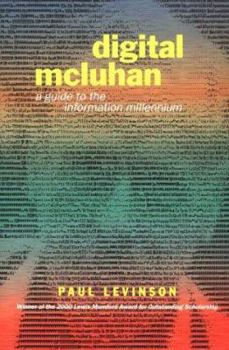Digital McLuhan: A Guide to the Information Millennium
Select Format
Select Condition 
Book Overview
This seminal book highlights and explains the truly prophetic nature of McLuhan's theories. It shows us why and how the 'Wired' generation is now turning to McLuhan's work to better understand a global village in a digital age.
Format:Paperback
Language:English
ISBN:0415249910
ISBN13:9780415249911
Release Date:March 2001
Publisher:Routledge
Length:240 Pages
Weight:0.86 lbs.
Dimensions:0.7" x 6.2" x 9.2"
Customer Reviews
3 ratings
For any who would apply McLuhan's perspective to modern time
Published by Thriftbooks.com User , 24 years ago
The author worked with McLuhan at the end of the 1970s and here explains the public's fascination with and perceptions of McLuhan and his theories. Chapters provide modern links between these theories and the experiences of the computer world in modern times, developed after he died in 1980. Essential for any who would apply McLuhan's perspective to modern times.
Presents McLuhan?s ideas about media
Published by Thriftbooks.com User , 26 years ago
Marshall McLuhan was a media theorist whose path-breaking insights about the impact of media are regarded as seminal.Digital McLuhan is actually two intertwining books: one presents McLuhan's ideas about media and their impact upon our lives, the other presents the author's ideas about how McLuhan's ideas can help us make sense of our new digital age. It presents a lucid assessment and readable explication of McLuhan's method and 13 of his major insights and what they can tell us about the new world we are well on the way to creating. It highlights and explains the truly prophetic nature of McLuhan's theories on media. At the time they were first propounded, everyone thought McLuhan was talking about television, but what he was really talking about was the Internet-two decades before it appeared.Paul Levinson explains the relevance of McLuhan's work for an understanding of new media. This guide to the information millennium is a deliberate wake-up call to those unaware of the profound power of the Internet to reshape our lives and society.Paul Levinson is President and founder of Connected Education, offering postgraduates courses on the Internet for more than a decade. He is author of The Soft Edge, Mind at Large, Electronic Chronicles and Learning Cyberspace. He is visiting Professor of Communications at Fordham University in New York City. He obtained a PhD in Media Biology from New York University in 1979.Reviewed by Azlan Adnan. Formerly Business Development Manager with KPMG, Azlan is currently Managing Partner of Azlan & Koh Knowledge and Professional Management Group, an education and management consulting practice based in Kota Kinabalu, Malaysian Borneo. He holds a Master's degree in International Business and Management from the University of Westminster in London.
Excellent update of McLuhan's metaphors to today's media
Published by Thriftbooks.com User , 26 years ago
I'm a multimedia artist and an educator, and McLuhan's metaphors have helped me grasp the media revolution that has been part of my life since the 50's My understanding of Marshall McLuhan's media concepts has improved by a quantum leap since reading Dr. Paul Levinson's digital mcluhan. This book has helped me understand how my early studies of media in the `60s, influenced by McLuhan, relate to my interest in digital media today. The writing is scholarly, yet concise and easy to understand. The author communicates joy in being able to tie everything together into our emerging Internet-centric multimedia universe. This is an academic book that should interest all educated media-savvy readers because of its clear, methodical explanation of McLuhan's insights. One of the best features of this tome is a clear, step by step discussion of McLuhan's metaphors: hot/cool media, the global village, acoustic/visual space, linear/mosaic, light-through/light-on, the "rear view mirror" of media perception, and the "tetrad" or four laws of media."McLuhan asks four questions to clarify the nature & impact of a medium- 1. What does it enhance or amplify in the culture? 2. What does it obsolesce or push out of prominence? 3. What does it retrieve from the past, from the realm of the previously obsolesced? 4. What doees the medium reverse or flip into when it reaches the limits of its potential?" Now I will attempt to apply these media metaphors to my career as a multimedia artist. Professor George Drury, of the Humanistic Studies first introduced me to McLuhan in 1966 at Monteith College, Wayne State University in Detroit, Michigan. Knowing my interest in multimedia, he suggested that I read Understanding Media while I was taking his Seminar on the Divine Comedy. Dr Levison discusses the media revolution that the use of "electric" rock music created.I was doing "light shows"(lumia, the art of light and color) at rock concerts nights while attending class days. This is a harmonic echo of my `60s experiences. Using McLuhan's metaphors, I viewed lumia (the art of projected light and color) through the rear view mirror of art history: as an extension of the Gothic cathedral's 3D space, and stained glass windows. So, for me, the'60s "dance concert" then is an extension of the metaphor of acoustic space. Students then and now live in a "field" of knowledge, created by media. In the `60's my favorite media included lumia, electric rock, film animation, comics, and 35 mm photography . Members of today's "Generation Y " having grown up with computers, video games, and the web have a more intuitive grasp of digital media, especially 4 dimensional concepts and interactivity ("view then do then view, etc."). The WWW is developing as they grow up. This field of knowledge, unlike linear "book" knowledge is hyperlinked-a mosaic of information. As Mcluhan says, "there are no remote places, under instant circuitry, it's now, right






